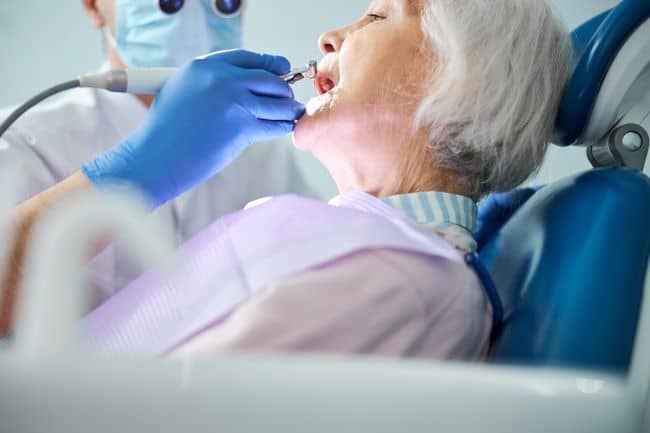How Lack of Appetite and Aggression Can Be a Sign of Dental Pain in Nursing Home Residents
Have you ever had a toothache or something stuck between your teeth? People often describe it as the worst pain ever.
Now, imagine if you were unable to communicate the pain you were experiencing? For nursing home patients who cannot travel to a traditional dental office, regular dental visits are crucial for identifying dental problems such as toothaches and preventing complications.
Our mobile dental clinic travels to nursing homes and aged care facilities to ensure everyone gets the dental care they deserve. Here, we’ll look at the causes of toothaches, how they can lead to loss of appetite and aggression in nursing home patients, and why prompt treatment is so important.
What Causes A Toothache?
A toothache can result from anything from a bacterial infection to a broken tooth to a piece of food stuck between your gums. Serious toothaches require prompt treatment by a dental professional to resolve the pain and prevent further complications.
The most common cause behind a toothache is tooth decay, although the early stages of decay may be asymptomatic. Other causes of a toothache include:
- Tooth decay
- A broken tooth (tooth fracture)
- A damaged or lost filling
- An abscessed tooth (a bacterial infection inside the tooth)
- Repetitive motions that wear down the teeth, such as teeth clenching or gum chewing
- Infected gums
- Impacted tooth
- Removal of a tooth
Sometimes a toothache can be the result of another health problem, such as:
- A cluster headaches
- A sinus infection
- A heart attack
- Viral infections
- Nerve-related disease
- Diabetes
- Alcohol or drug use
- Vitamin deficiencies
What Are the Symptoms of a Toothache?
Toothache symptoms vary from patient to patient and may result in a variety of issues, including:
- Sharp, throbbing, or constant pain
- Pain when biting down
- Headache
- Fever
- Swelling around the tooth
- A bad odour coming from the mouth
- Trouble breathing or swallowing (call your dentist immediately if this is the case)
Why Are Toothaches Painful?
The pulp inside your tooth is a soft material packed with sensitive nerves, blood vessels, and tissues. When the nerves become irritated or infected by bacteria, it can result in severe pain.
Can A Toothache Go Away Without Treatment?
Minor toothaches may go away without treatment, but more serious toothaches require evaluation by a dentist. For minor toothaches, try to avoid chewing on the affected area, consume only soft foods, and avoid very cold or hot foods.
How Is A Toothache Treated?
After a thorough evaluation, your dental professional will decide on a course of action for treating the toothache. Treatment depends on the cause of the toothache and may include:
- A root canal if the tooth’s nerve is infected
- An antibiotic if there is fever or swelling of the jaw present
- A deep cleaning
- Cavity treatment
How Can Toothaches Be Prevented?
Since most toothaches occur because of tooth decay, proper oral hygiene is the first line of defence against toothaches.
Here are some oral hygiene tips to follow to help prevent toothaches:
- Brush twice a day with a fluoride toothpaste
- See your dentist at least twice a year for a dental checkup and professional cleaning
- Eat a diet low in sugar
- Floss at least once a day
- Ask your dentist if sealants or fluoride application would be beneficial for you or your loved one
What Are the Possible Complications of Toothaches in Elderly Patients?
Individuals who are dealing with tooth pain or sensitivity may avoid eating or drinking or display uncharacteristic aggression. Nursing home residents, especially those with cognitive conditions such as dementia, may be unable to communicate the pain they are experiencing.
If a loved one or a staff member notices a lack of appetite or aggression in a patient, consider having a dentist evaluate the patient’s oral health. If infection or tooth pain is present, it could be a possible cause behind aggression or lack of nutrition.
How To Help Your Elderly Loved One
If you have a spouse, friend, or parent who has difficulty following an oral health routine and maintaining a healthy mouth, you may be wondering how to help.
Here are tips for helping your elderly loved one maintain proper oral health:
- Help your loved ones keep their mouth clean by reminding them to brush and floss daily (and helping them if needed)
- Ensure that your loved one receives regular professional dental care
- If your loved one struggles with oral hygiene, ask your dentist for tips or different approaches to try
- Pay close attention to the eating habits of your loved one and make note of any changes
Are You Concerned About the Oral Health of an Elderly Loved One?
If you have a loved one in a nursing home or aged care facility who cannot travel to a traditional dental office, feel free to reach out to our team of dental professionals to find out how we can help. Using state-of-the-art equipment and groundbreaking technology, our team of experts can provide top-quality, caring dental care to your loved one from the comfort of their place of residence.
Our priority is ensuring every patient receives effective, comfortable, caring dental treatment, regardless of their age or health status.


